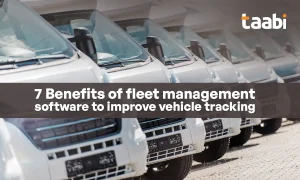Fuel economy refers to the maximum distance a car can travel on one amount of fuel. Fuel efficiency depends heavily on car make and model; smaller cars consume less gas per mile (MPGs). Fleet managers may utilise various strategies for increasing their vehicles’ efficiency about this criteria – from tracking driving patterns that waste fuel (such as slowing down, speeding up, or taking routes that use up less gasoline to discovering alternative solutions.
Turning off the engine when parked for over 30 seconds saves fuel. Idling also consumes unnecessary resources; drivers should implement no-idling policies at train crossings and traffic jams to conserve gas consumption. The article is based on survey results and the majority-based findings. Do You Want to Maximise Fleet Management Results and Cut Fuel Waste? Taabi provides cutting-edge fleet management technology to boost fleet performance while driving significant cost savings. Real-Time Fuel Monitoring: Taabi’s advanced monitoring features enable real-time insight into fuel consumption for fleet management purposes – monitor levels, identify inefficient vehicles and take preventative actions against wastage of precious petroleum. An intuitive dashboard offers clear visibility into usage, so informed decisions and effective fuel-saving strategies may be implemented efficiently and successfully. Taabi enables cost Saved on Fuel and Uptime, helps save the company’s cost, and Less Breakdown means saving overall cost.
Tires that are under-inflated waste fuel and increase wear. Furthermore, reduced traction increases the risk of accidents and increases toxic emissions that pollute the air.
Fleet managers can enhance fuel efficiency with relatively simple vehicle and operation adjustments. Reducing wait times between loads or unloads and morning warm-ups being limited to two minutes or less, as well as restricting trips made when vehicles are empty, can save a significant amount in terms of money saved on fuel consumption.
Fleets can reduce fuel costs further by improving aerodynamics. This can be done by simple measures such as lowering windows, eliminating unnecessary cargo, or using cruise control when travelling on open highways to eliminate constant acceleration/deceleration, which gobbles fuel.
Idling an engine wastes fuel and produces pollution that harms the environment, as well as creating undue wear and tear on its engine, shortening its lifespan and necessitating more costly repairs in time.
Fleet managers should encourage drivers to turn off their engines when stopped for extended periods, such as at traffic lights or train crossings. Restarting only takes 10 seconds worth of fuel, and frequent restarting causes less damage than continuous idling.
Drivers can save fuel by driving energy-efficiently and employing cruise control on long journeys. Rerouting drivers from congested highways to more efficient routes will decrease unnecessary idling, increasing productivity and reducing operational costs.
Fleets implementing route optimisation software can experience significant fuel savings by enabling drivers to travel the most economical routes to reach their destinations. Explore all available options to see which would work best for your business.
Removing unnecessary items from vehicles can help to reduce fuel consumption. As per the EPA, Every 100 pounds added to a mid-sized vehicle decreases fuel efficiency by around one percent; techniques such as placing bulky equipment in the trunk or disabling roof racks when not needed may help fleet vehicles improve their economy and enhance fuel savings.
Hypermiling has quickly become an essential fuel-efficiency strategy for fleets of all sizes. This driving technique uses less gas, making it more cost-effective. Implementing hypermiling into your driver training programs could significantly lower fuel costs across your fleet. Taabi helps companies reduce fuel expenses, saving resources and time by monitoring consumption patterns and implementing strategic plans to save fuel over time. Our solution also assists fleet uptime management by proactively detecting issues before breakdowns occur and thus further cutting operational expenses.
By focusing on fuel-saving techniques, driver tracking , and driver management , fleet managers can optimize fuel efficiency, minimize waste, and achieve significant cost savings.
On open roads, the optimal speed should typically fall between 40 and 55 miles per hour – this may vary depending on the car model and type. Any higher than this causes efficiency to decline rapidly.
Repeated acceleration and braking use more fuel, particularly when travelling uphill. To reduce consumption, plan ahead for any potential inclines by gently accelerating before reaching them so you can maintain momentum and allow gravity to do its work. Where appropriate, cruise control on highway drives helps drivers maintain an even pace without sudden speed shifts or acceleration. Learn how to reduce fuel consumption.
Many people forget that air conditioners consume considerable fuel when in operation, according to Dunwoody College of Technology automotive instructor Steve Reinarts. His research shows that using your AC can lower gas mileage by as much as 25%.
Speeding wastes fuel and increases the risk of accidents, while driving faster than allowed can incur heavy fines and damage your vehicle more quickly. Look at the means in this article to reduce fuel consumption.
Drivers decide how fast to drive using cues from their surroundings, such as landscaping, houses, and sidewalks. Research has demonstrated that installing electronic speed-feedback signs can help drivers realise how far they have driven.
People can become tempted to speed when confronted by other drivers pressuring them into driving faster. Remember to remain calm and that speeding costs more than money – it can cost lives! Fleet managers can help drivers avoid speeding by encouraging route optimisation software or sending newsletters with fuel-efficient driving tips.
Idling vehicles consume gas even when not moving forward, raising more costs than just their average per-gallon cost. Furthermore, prolonged idling leaves residue that damages engine components and increases maintenance expenses over time.
Stop-start systems can save fuel by shutting off your engine at red lights or traffic stops, thus decreasing both consumption and emissions while helping your fleet achieve greater fuel economy.
Drivers should attempt to anticipate approaching traffic lights and accelerate slowly or use cruise control whenever possible. Driving aggressively wastes fuel and can damage tires, brakes, and other parts of the vehicle; research shows that eliminating unnecessary acceleration/braking can reduce fuel consumption by as much as 20% and save over half a tank yearly!
Acceleration uses a lot of fuel, so having drivers gently press the accelerator pedal is key to fuel efficiency and prolonging engine, brake, and tire lifespans.
Harsh braking wastes fuel and can be unsafe for drivers and other motorists. Fleet drivers should always assess traffic conditions before accelerating or slowing down; cruise control on flat highways helps them keep a consistent speed without abrupt acceleration or braking. Consider how can the fuel consumption in vehicles be reduced. Look at the means in this article to reduce fuel consumption. Learn how to reduce fuel consumption.
Leave items like roof racks out of your vehicle to reduce wind drag and improve fuel economy by up to 1%, so encourage drivers to carry less rooftop cargo whenever possible. Altering truck, upfit, and tractor specifications to optimise fuel economy may also help lower fleet fuel costs; changing tire size, gearing, or powertrain specifications could all reduce fleet fuel use.
One effective strategy for cutting fuel costs is minimising unnecessary braking while driving, saving money, and being safer for drivers and other motorists.
Slamming on the brakes increases fuel consumption and wear on a vehicle’s brakes, while excessive acceleration forces engines to consume more fuel while contributing to pollution.
Stable cruising speeds help your engine perform more efficiently, so avoid small dips in speed followed by bursts of acceleration; use the cruise control to maintain an even cruising speed on highways and byways. Consider how can the fuel consumption in vehicles be reduced. Look at the means in this article to reduce fuel consumption. Learn how to reduce fuel consumption.
Cargo increases aerodynamic drag and fuel economy. To reduce this drag, remove unnecessary items from your roof or tailgate and weigh down your vehicle accordingly. Air conditioning consumes fuel quickly, so be careful in its usage.
Every business aspires to lower fuel costs. Unfortunately, fleet vehicles that idle without being used consume an alarming amount of fuel and produce pollution without moving. Each day approximately six billion gallons of gasoline and diesel are wasted due to unnecessary idling — this costs businesses millions.
Idling engines waste fuel and can wear down engine components more rapidly than restarting them, potentially costing more to repair or replace than simply restarting them.
Consider how can the fuel consumption in vehicles be reduced.
Look at means to reduce fuel consumption.
Learn how to reduce fuel consumption.
To reduce fuel consumption in automobiles, one should follow the above steps.
Learn how can the fuel consumption in vehicles be reduced i.e. fuel expenses.
No matter if a driver is stopped at a red light or waiting outside a grocery store for their significant other to pick something up, turning off their engine can save significant fuel usage and usage by restarting it more often than idling requires less fuel consumption; Telematics and AI can assist drivers with monitoring fuel consumption and decreasing idling time. Taabi’s comprehensive fleet management system improves overall operational efficiencies by using real-time data and intelligent analysis to make informed decisions regarding routes, maintenance schedules and driver performance optimisation – ultimately helping maximise productivity while decreasing expenses.
At Taabi, we aim to assist fleet companies with cutting fuel costs and improving operational efficiencies. Visit Taabi for more information about how our advanced fleet management solutions can assist them in meeting their fuel consumption reduction goals.









